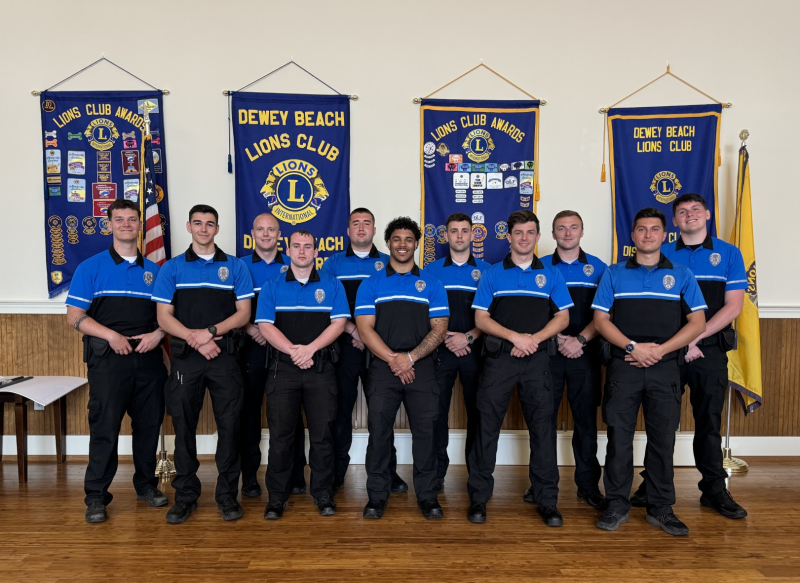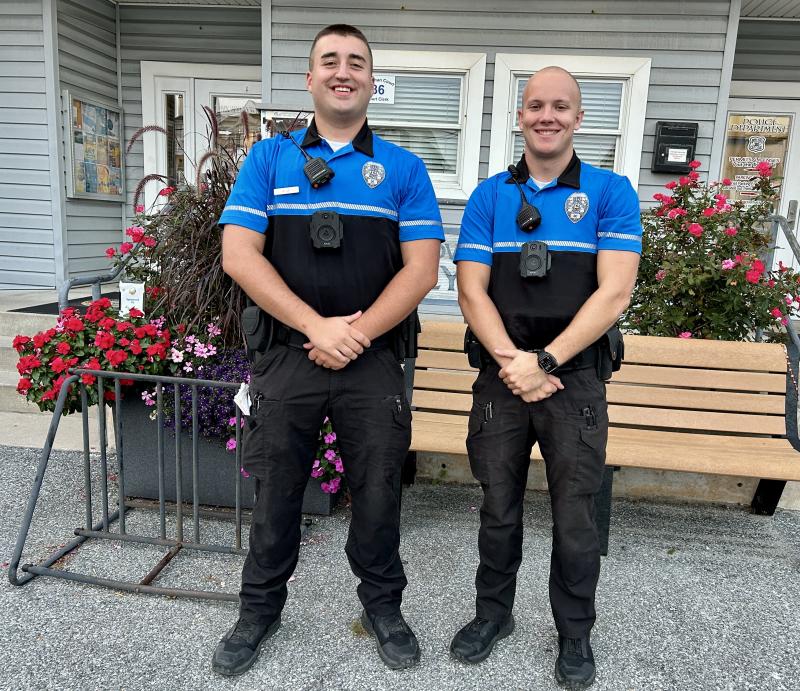Dewey Beach seasonal police program grows officers

Dewey Beach’s seasonal police program provides experience and education that helps potential career officers determine whether the field is right for them, said two seasonals now heading to police academies.
Second-year seasonal Adam Ur was just hired as Dewey’s 13th and final budgeted full-time officer, and heads to the Dover Police Academy Oct. 20.
Originally from Sussex County, N.J., Ur heard about the program through a football teammate who had worked as a seasonal officer. After graduating from Kutztown University with a bachelor’s degree in criminal justice, Ur moved to the Cape Region.
“I had never been here before, and I just went for it,” Ur said. “You either love policing, or you don’t, and the program allows you to fully immerse yourself in the role. It’s the best seasonal program because you have more responsibility and deal with more than anywhere else.”
Every night is different, Ur said, and seasonals can do everything full-time officers do except carry a gun.
“We can be first to respond, and we see it all,” Ur said. “The program helps you learn about report writing, pages and pages every week. It’s about 90% of the job, and it made me confident in my report writing skills, which is another benefit of the program.”
Third-year seasonal officer Frank Bunting agreed. The Indian River High graduate received his associate’s degree in business from Delaware Technical Community College and will leave for the Delaware State Police Academy Sept. 15.
Bunting said he’s always wanted to join the state police. “They have special units and lots of opportunities,” he said. “I like to spread my wings. It’s a large jurisdiction, and DSP fits my personality the best.”
Policing in Dewey can be unpredictable, and officers get called for something new each time, he said.
“Good coworkers make it fun, and you get to deal with complaints directly,” he said. “As a seasonal, you have full arrest powers, and you receive knowledge and training.”
Bunting said he has noticed some changes to the program over the past several years. The original five days of seasonal training has been expanded to multiple weeks of hands-on training, he said.
“It’s a good change for the better and leads to a better class of seasonals,” he said. “It builds a better package for a full-time agency.”
Additionally, Bunting said he noted a shift in the department’s focus and culture.
“It’s more community-focused,” he said. “Now, in addition to key arrests and calls for public help, we also post positive things on our Facebook page. It’s crucial to try to find [wanted] people, but it’s good to let them know about the positive interactions too.”
Such outreach is important in a small community, Ur said.
“Dewey’s about a mile long and half a mile wide, so we need to form positive relationships with the people in town,” he said. “Community policing is the most important thing.”
Ur said he looks forward to the new station town leaders hope to begin construction on this fall.
“Being a part of something new, being able to start a tradition – Dewey has that to offer,” he said. “I get to be part of a team I really care about.”
Dewey seasonal officers can be as young as 18, so they can work during summer while in college to make sure the job suits them, Bunting and Ur both said.
“I definitely recommend anyone considering policing to come through and apply,” Ur said.
While seasonals don’t have guns, they carry pepper spray, batons, handcuffs and medical supplies, they said. Ur was the first seasonal to be trained in the use of a Taser, he said.
The department had 11 seasonal officers this year, and of those, five are headed to police academies, said Lt. Cliff Dempsey. Chase Morris will join Ur at Dover Police Academy, and Joe Kane and Sean Armstrong will be with Frank Bunting at Delaware State Police Academy.
Seven of Dewey's 13 full-time officers were originally seasonals, said Dempsey, who was a seasonal officer with Delaware Department of Natural Resources and Environmental Control at the Indian River Inlet for three years before he joined the department.
The program has gone through significant changes since its 1984 inception, Dempsey said.
“Initially designed to address the specific needs of the community during peak times, this program has evolved significantly over the years to meet the growing demands of both residents and visitors,” Dempsey said.
In its early years, the program comprised about five seasonal officers who worked to ensure public safety, manage increased foot traffic, and address challenges posed by an influx of tourists, Dempsey said.
Through the 1990s and early 2000s, the program grew considerably, Dempsey said, peaking at 40 seasonal officers in response to a rise in tourism and the subsequent demand for increased law enforcement.
As the number of full-time police officers increased, the reliance on seasonal officers began to decrease, Dempsey said, leading to a gradual reduction in positions.
By the early 2020s, the number of seasonal officers had been reduced to fewer than 15, he said, a realignment designed to balance department resources while maintaining an adequate level of support during peak times.
Training that seasonal officers undergo is critical, Dempsey said. Dewey Beach police officers staff this academy which includes instruction from several other Delaware-certified police instructors from partner agencies.
“The program has continuously adapted to meet the needs of the community and remains a vital component of maintaining public safety in Dewey Beach,” Dempsey said.



















































